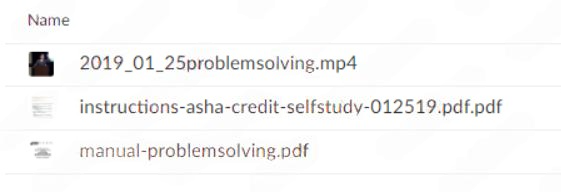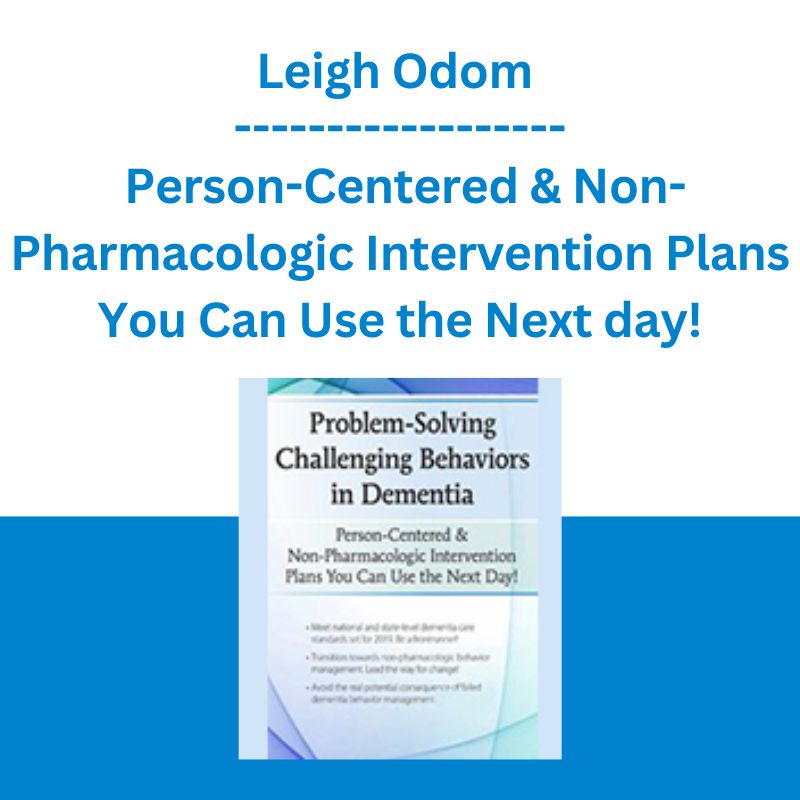*** Proof of Product ***

Exploring the Essential Features of “Leigh Odom – Problem-Solving Challenging Behaviors in Dementia: Person-Centered & Non-Pharmacologic Intervention Plans You Can Use the Next day!”
Description
This recording has been designed specifically for you, the frontline dementia care professional who is providing the best care possible to dementia patients living with moderate-severe stages. They display complex and challenging behaviors, like agitation, hitting, screaming, wandering, delusion, resistance and withdrawal.
Persons with dementia need increasing support that is provided in a way that communicates friendship, compassion and dignity. However, those of us in a support role experience first-hand the frustration, disappointment and even anger that accompanies the day-to-day responsibilities of dementia caregiving – often leading to burnout due to emotional exhaustion, depersonalization of patients and feelings of failure. That is not the personal level of care you sought to give others while in school.
Avoid the real potential consequence of failed behavior management in your dementia care – join Leigh Odom, Ph.D., CCC-SLP, CDP, CADDCT and learn evidence-based non-pharmacologic treatments and person-centered strategies to minimize the effects of dementia behaviors. Watch and come away with:
- A systematic approach to developing individualized behavior plans that are more likely to work the first time
- Methods to accurately identify common causes and manifestations of challenging behaviors
- Management strategies to directly target the trigger causing the undesired behavior
- Communication strategies to use with persons with dementia as a behavior management strategy
- Strategies to manage the potential consequences of compassion fatigue and burnout
Developing person-centered behavior plans in dementia care results in higher quality care, increased quality of life for the patient and decreased provider burnout. For your benefit and that of your patients, register today and get the dementia care training to be a better problem-solver!
Speaker
Leigh Odom, PhD, CCC-SLP, CDP, CADDCT, is an associate professor of speech-language pathology at Western Carolina University. She has been practicing as a speech-language pathologist for nearly 15 years almost exclusively with families affected by neurogenic communication disorders. As the lead academic and clinical instructor of neurogenic content in her department, Dr. Odom has been teaching both graduate and undergraduate neurogenic courses since 2008. Dr. Odom is a Certified Dementia Practitioner and a Certified Alzheimer’s Disease and Dementia Care Trainer, frequently collaborating with families and healthcare providers to improve dementia care as a dementia care trainer and support group facilitator. She has published nearly 20 articles in peer-reviewed research journals, and has led numerous trainings at state and national professional conferences. Dr. Odom is a member of the American Speech-Language-Hearing Association, the Academy of Neurologic Communication Disorders and Sciences, and the North Carolina Speech-Hearing-Language Association.
Speaker Disclosures:
Financial: Leigh Odom maintains a private practice. She is an associate professor at Western Carolina University. Dr. Odom receives a speaking honorarium from PESI, Inc. She has no relevant financial relationships with ineligible organizations.
Non-financial: Leigh Odom is a member of the American Speech-Language-Hearing Association; Academy of Neurologic Communication Disorders and Sciences; and the North Carolina Speech-Language Hearing Association.
Objectives
- Describe potential antecedents to complex and challenging behaviors common to dementia.
- Distinguish between the dementia-related behaviors that warrant a behavior management plan and those that do not.
- List the components of a comprehensive behavior management plan as it relates to symptom management.
- Differentiate between comprehension and superficial descriptions of behaviors to inform choice of clinical interventions.
- Construct a behavior management plan to address causes of problematic behaviors including, but not limited to, communication and environmental changes.
- Propose behavior management strategies appropriate to address specific behavior manifestations such as hitting, screaming, wandering and hallucinations.
Outline
Dementia: Major Neurocognitive Disorders (MND)
- Cognitive and psychological changes
- DSM-5® diagnostic criteria
- Etiologies of dementia
- Changes in dementia care
”Unpacking” Behaviors in Dementia: Case Examples
- Manifestation, Causes and Management Strategies
Aggression
– Verbal – Screaming, cursing
– Physical – Hitting, scratching, grabbing
Nonaggression
– Verbal – Repetitive questioning, disagreeing
– Physical – Wandering, pacing, hoarding, rummaging, hiding, voiding, shadowing, resistance
Affect-Mood – Anxiety, depression, irritability, apathy
Thought and perception – Hallucinations, delusions
Vegetative symptoms – Sleep disturbances, sexuality, appetite
Behavior Management Plan Development
- A Comprehensive Step-By-Step Guide with Worksheets and Checklists
Explicitly describe the behavior
Assess impact of cognition, emotion, medical status, personal history on behavior
Identify the cause of the behavior
Interventions to address causes of behaviors
– Environmental changes
– Communication changes
– Schedule changes
– Medical changes
– Staff changes
Write a thorough behavior intervention plan for the entire care team
Evaluate the success of the behavior management plan or reasons for failure
Write a Behavior Management Plan: Case Examples
- Group activity using case examples
- Situations that you encounter on a regular basis
- Apply your knowledge and leave with a behavior plan in place
Improve Communication with the Person with Dementia
- Verbal communication strategies
- Nonverbal communication strategies
- Environmental modifications to enhance communication
- Role play communication strategies
Compassion Fatigue and Burnout
- Impact on dementia care
- Causes, signs and symptoms
- Prevention/remediation strategies to renew your passion!
Target Audience
- Social Workers
- Speech-Language Pathologists
- Occupational Therapists
- Occupational Therapy Assistants
- Nurses
- Psychologists
- Counselors
- Physical Therapists
- Physical Therapists Assistants
- Recreational Therapists
- Nutrition/Dietetics
- Music Therapists
- Nursing Home Administrators
- First Responders
- Law Enforcement
Please see the full list of alternative group-buy courses available here: https://lunacourse.com/shop/









